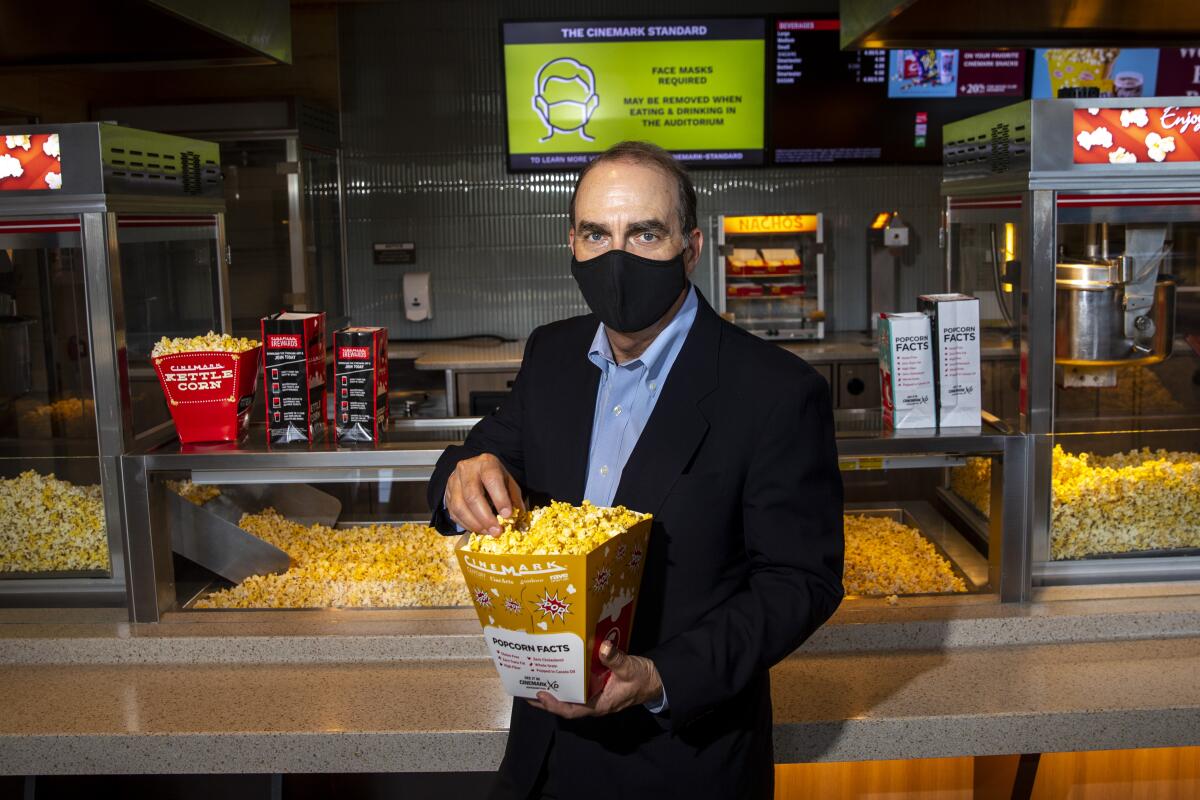After navigating through a pandemic, Cinemark CEO Mark Zoradi will retire

- Share via
Cinemark Holdings Chief Executive Mark Zoradi, who has led the nation’s third-largest theater chain through the COVID-19 pandemic and a streaming revolution in Hollywood, will retire at the end of the year, the company said Wednesday.
Inside the business of entertainment
The Wide Shot brings you news, analysis and insights on everything from streaming wars to production — and what it all means for the future.
You may occasionally receive promotional content from the Los Angeles Times.
Zoradi, a former Walt Disney Co. executive who joined Plano, Texas-based Cinemark in 2015, will remain a board director of the exhibitor, which operates 523 theatres with 5,872 screens, the company said.
He will be succeeded by Sean Gamble, who currently serves as Cinemark’s chief financial officer and chief operating officer.
“Sean has been a tremendous partner in overseeing Cinemark’s operational execution and strategic vision, as well as effectively navigating the prolonged effects of COVID-19,” Zoradi said in a statement. “As the industry is now on the path to recovery from the pandemic, I felt it was time to begin transitioning the CEO role to Sean’s capable hands.”
Zoradi’s decision to retire comes amid an ongoing pandemic that has hobbled the movie industry for nearly a year and a half.
Theaters were closed for months after the coronavirus hit the U.S. in March 2020. Most American multiplexes have reopened, but the box office recovery has been tenuous, with lingering fears of COVID-19 and competition from streaming services that offer new films simultaneously with their theatrical release.
Everything is frontloaded now, as studios make streaming era trade-offs. PLUS: Can Olympics and exorcists boost Peacock?
The 67-year-old industry veteran had planned to announced his retirement last year, but decided to stay and guide the company through the public health crisis that did massive financial damage to the sector. Zoradi said in an interview that he wanted to step back and slow down after years of making weekly trips between Los Angeles and the Dallas-Fort Worth area.
With the business finally on the mend, Zoradi said, the time was finally right to exit. “I know we’re not completely out of it yet,” he said, “but we’re starting to see the light at the end of the tunnel.”
Cinemark’s locations include Los Angeles, Long Beach, Carson, Playa Vista and North Hollywood.
The pandemic has been brutal for movie theaters.
In the most recent quarter, which ended in March, Cinemark reported revenue of $114 million, down nearly 80% from the same period last year. The company lost more than $200 million during the quarter.
There have been signs of life at the summer box office, with movies such as Disney’s “Black Widow” and Warner Bros.’s “Space Jam: A New Legacy” opening to solid numbers.
But sales for those films have dropped off quickly in subsequent weeks, partly because they’re available online at the same time. The “Space Jam” sequel is on HBO Max for a month at no extra cost to subscribers, while “Black Widow” is on Disney+ for an additional $30. There’s also the matter of the virus. Cases and hospitalizations are increasing as the Delta variant spreads, causing concern among health officials.
The business of releasing movies has warped dramatically during the pandemic, with studios bringing films to streaming and video on-demand much faster than before. What was once an industry standard of 90 days between a movie’s theatrical release and its home video availability has shrunk to 45 days or fewer.
Theaters like Cinemark are trying to adapt by making deals with the studios to lessen the financial blow of shorter theatrical windows. Cinemark also experimented by working with Netflix to give its movie “Army of the Dead” a one-week exclusive theatrical run before streaming.
Zoradi spent most of his four-decade entertainment industry career on the studio side of the business, giving him a window into both sides of film distribution. Before Cinemark, he served as chief operating officer at Jeffrey Katzenberg’s DreamWorks Animation and, before that, Dick Cook Studios.
He spent the bulk of his career at Walt Disney Co., where he worked for three decades, eventually becoming president of the Burbank entertainment giant’s motion picture group. He left the studio in 2009 amid a broader restructuring at the company.
More to Read
Inside the business of entertainment
The Wide Shot brings you news, analysis and insights on everything from streaming wars to production — and what it all means for the future.
You may occasionally receive promotional content from the Los Angeles Times.












